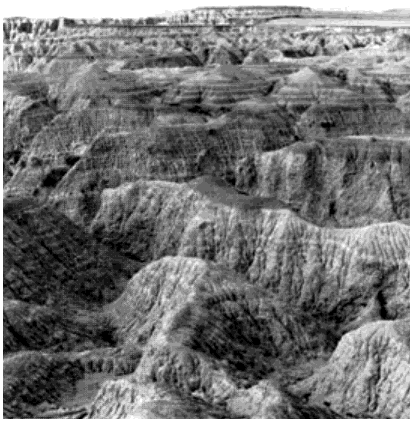Like Home
Notes from a Western Life
Linda M. Hasselstrom
(University of Nevada)

One of the most unnerving tales is of the break-up of a huge ranch, almost two thousand acres, near Custer, South Dakota. It had been carefully maintained by its sole owner, following the time-honored rules of the bad lands: don't overgraze the land (maximum, one Holstein each ten acres); build houses in the arroyos to protect from the winds; don't have your house or barn (or garage) doors open to the south (that's where the snow comes from, and piles up); conserve water --- there is very little of it. And, finally, be nice to your neighbors. Because someday, you are going to need their help, most especially in time of prairie fires, which can often not be contained by the local volunteer fire departments.
Ms. Hasselstrom was there when the ranch was sold in several parcels, to hicks like me from California, who didn't know about the lack of water: wells had to be drilled to 4,000 feet ... and even some of them didn't pan out. Others did not have effective access to their own parcels, had to deal with people like Ms. Hasselstrom who didn't much care for this invasion of outsiders. They certainly didn't know that their urban cars could be such a disaster (for them and others): catalytic converters are hot, ride low to the ground under the car, can set fire to the dry plains in an instant.
All this irritated the author so much that she wrote a ten page "Dear John" letter to a man who didn't know the rules of the prairie, and certainly didn't know that our writer was toting a pistol when he confronted her over his car, the one that got fried along with several acres of her property. "Our modern shootout involved phones, lawyers, and answering machines," says Hasselstrom:
- I wish we could have continued to negotiate face to face until we both calmed down.
Lest you think that Linda is just a crabby old lady who grew up in the badlands, she tells us at one point she did it all with the rest of us in the 60s ... marching against the war, confronting police --- tear-gas, the works. She then came back to the high plains and relearned the rules of the ranch: Don't mess with your neighbors. And mind your septic tank.
One of the best passages in No Place Like Home tells of the septic tank cleaner who "chuckled as he climbed down from the cab," and, in his waders, "chortled as he lowered himself into the septic tanks and splashed around, up to his armpits in gunk." After sucking it dry with a big hose, gack,
- he climbed out and shook like a retriever, flinging gobs of slime over my father, me, the dog, and the white siding of the house.
I would never want to accuse the author of being one who has a magic ability to drum up trouble, but when she moves to Cheyenne, she finds herself in an ancient house replete with neighborhood drug-addicts, drunks, speed freaks, noisy juveniles in their noisy cars and paper and broken glass and dog shit and condoms everywhere.
Trying to light a candle rather than curse the darkness, Ms. Hasselstrom busies herself planting hollyhocks in the waste-filled alleyway, along with loading up black trashbags with the broken glass and dog shit etc etc.
She wants to be a good neighbor, but unfortunately, since her nearest neighbor is a popinjay --- being a young lady with child and a drug habit (and several disgusting young men crawling in the windows of her place day and night) --- Hasselstrom spends more time getting herself (and presumably the reader) worked up about the day-in day-out complaints of living next door to a bunch of drug heads.
I come to this with a bit of experience, because when I was living in a slightly shabby neighborhood of a certain unnamed California city of moderate size, I had a neighbor whose garage was jam-packed against my bedroom (our houses built before zoning) who was a "tweaker." That meant that he not only used crystal meth, but spent many of his happiest 3am sleepless nights tweaking up the engine on his miserable fifteen-year-old Camero in the garage.
When I had the temerity to suggest that there were better times of the day to tune up your Camero, war broke out: the galloot took to sabotaging me in the usual ways (threats, dead rats on my lawn, additional --- and all-night --- tune-ups, etc.) Since I am not one to escalate wars by calling in the cops, I got back at him the only way I knew how: I moved away.
When Ms. Hasselstrom goes on page after page about the noise, the dirty diapers, the trampling of her hollyhocks, the racing cars, she fights back, gets herself in an uproar, and, in general makes her life miserable ... and, ultimately, is able to do little to change the neighborhood. May I take the liberty of suggesting that she pack up her flowers and her camera and what's left of her goodwill and get the hell back to the writer's colony she's set up there in the badlands of South Dakota and let these miserable citified young junkies stew in their own juices.